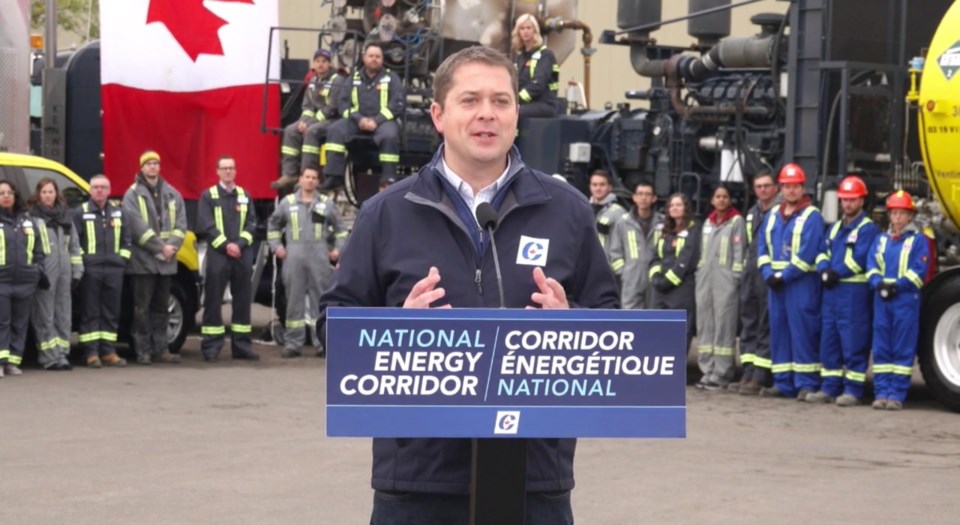Ever since February, when Premier Blaine Higgs of New Brunswick joined Saskatchewan Premier Scott Moe and federal Conservative Leader Andrew Scheer on a stage in Moosomin, there has been growing talk of a national energy corridor.
On Sept. 28, Scheer made it part of the official Conservative platform in this federal election, with an announcement on the campaign trail in Edmonton.
Standing before frac pumpers and workers in fire retardant coveralls, Scheer announced his intentions for a national energy corridor.
“Our country’s potential is as vast as the distance between our shores,” he said. “Leaders like Sir John A. MacDonald, whose vision of a country that spanned from the Atlantic to the Pacific led to the Canadian Pacific Railway.
“Like Louis St. Laurent, whose vision of a more engaged, more united nation, led to the St. Lawrence Seaway and the Transcanada Highway. Like John Diefenbaker, whose vision of a Canada of the north, led to the first all-weather road across the arctic circle.
“These were leaders who could see beyond what was there, so what there could be. Leaders who could turn to Canadians and say, ‘Follow me, the journey will be difficult, but the destination will be worth it,” Scheer said.
He took aim at Liberal Leader Justin Trudeau, saying since he took office as prime minister, Trudeau had repeatedly attacked Canada’s energy sector and the men and women who work in it. He cited Bill C-69, the Impact Assessments Act, as the “no more pipelines” bill, and C-48, the tanker ban off the norther British Columbia coast.
“The results have been as depressing as they have been predictable. Two major pipelines cancelled, Trans Mountain on life support. Investment has left the country, and hundreds of thousands of hard working people have lost their jobs.”
“Canada works better when we work together, and our natural resources can be a force for good,” Scheer said.
“A new Conservative government will create a national energy corridor to carry Canadian energy, and resources, from coast to coast.”
“It will move oil, gas, hydro, telecommunications and accommodate other linear infrastructure. It will be a transnational corridor, that will generate economic and social benefits for the entire country. A national energy corridor will provide Quebec with new opportunities to export its hydroelectricity to new markets. It will provide rural communities the opportunity to connect to vital telecommunications infrastructure. It will provide economic activity for Indigenous communities along the route,” Sheer said.
“With a single corridor, industry wouldn’t need to submit complicated route proposals for every new project. With a single corridor we could minimize environmental impacts, lower the cost of environmental assessments, without sacrificing quality, increase certainty for investors, get critical projects built, and create good-paying jobs.
Responding to reporters, he said it hasn’t always been difficult to build pipelines in Canada.
“I am convinced that with this idea, we can address some of the concerns that business communities have, some provinces have, and do assessments all up front, so when project proponents come along, the heavy lifting has been done, and they can do what they’ve always done, get pipelines built with private sector money, not with taxpayers’ money.”
“I know Quebecers understand it’s better to buy Canadian energy. It makes no sense that they’re spending their consumer dollar on energy that’s coming from the United States. I’ve made my choice. I support Canadian energy. I support Canadian energy workers. I think the world needs more Canadian energy. I think needs more Canadian energy. And this energy corridor will help us accomplish exactly that.”
He spoke of talking to people in the energy sector whose companies went bankrupt and their equipment went up for auction, only to be sold to work on projects in the U.S.
Asked about a preferred route for this corridor, Scheer said that would be determined by the blue ribbon panel after extensive consultations with Indigenous communities and premiers. “Obviously it will need to get to ports. We would envisage this to go through areas that would ultimately allow us to export our energy throughout the world. That would be the ultimate endpoint. How we get there, we’ll leave to the experts, the scientists, the geologists and the Indigenous leaders.”




